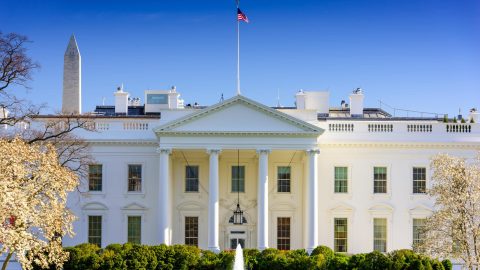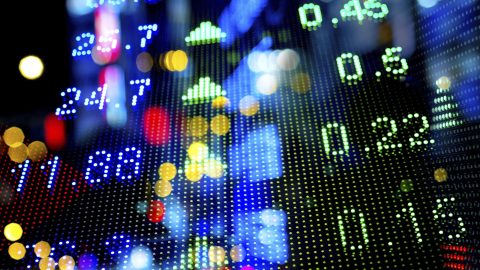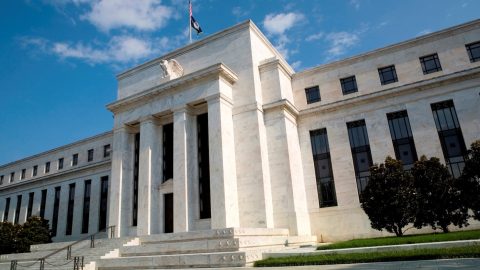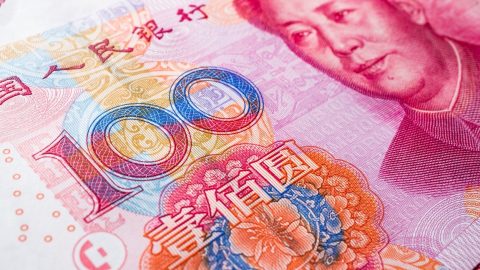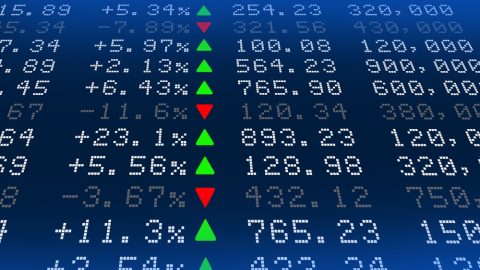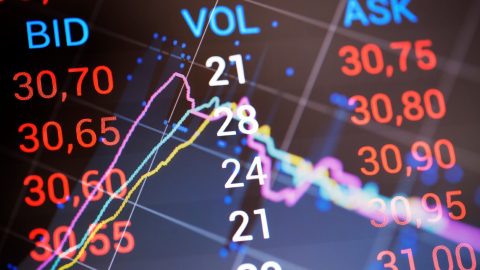The semiconductor industry is considered one of the biggest beneficiaries of the AI boom. Investors therefore kept a close eye on the sector’s figures for the first three months of 2025. One thing became clear: the expansion of AI infrastructure continues to deliver good results for most chip companies – but the sword of Damocles in the form of impending US tariffs is still hanging over industry giants such as Nvidia & Co. Read more in today’s blog post.
All articles on the topic “Markets and opinions”
US debt ceiling keeping the financial markets on their toes
The Trump administration should be keeping the financial markets on their toes in the coming weeks. Yet again, the issue is the government debt which will soon reach its statutory maximum.
Tailwind for biotechnology companies
Biotechnology shares have been among the top performers in the past ten years. After the above-average performance from 2010 to the beginning of 2015, hedge funds set off a consolidation that is now coming to an end. The NASDAQ biotechnology index, the most important barometer for biotech shares, has gained 25% in the year to date (source: Reuters Datastream, as of 31 August 2017).
Global stock markets: Break, correction or worse?
The probability that there is another leg up for global equity markets is bigger than a significant correction in the near-term. However, there are no guarantees when it comes to investments in stocks in contrast to, as somebody said, the purchase of a vacuum cleaner. In case that the earnings momentum is cooling down or, for example, the macro-backdrop deteriorates, an extended period of equity markets going sideways or a correction cannot be excluded.
Growth picking up in the emerging economies
Economic growth has increased significantly on a global scale and is broadly supported. According to our preliminary estimate, global GDP recorded a growth rate of 3.7% from Q1 to Q2 (annualised). While the developed economies have presumably grown by 2.7%, the emerging economies posted a growth rate of 5.2%. In this article, we would like to take a closer look at the emerging markets on the basis of classic economic indicators.
Solid Growth
Some ten years after the outbreak of the Great Recession, global economic growth is positive and broadly based, inflation is low in the developed economies and falling in important emerging economies, and monetary policies are very supportive, cautious, and predictable. At the same time, company earnings growth has increased significantly, and the volatilities of many asset prices are low. This environment is generally positive for risky asset classes.
Quo Vadis, Federal Reserve? – Part 3
I will be upfront about it: to me, the Taylor rule is still a helpful tool to assess the future monetary policy of the US central bank. However, it should not be used as blueprint without thinking it through. Instead, it should be seen as heuristic tool that helps structure one’s analysis.
Quo Vadis, Federal Reserve? – Part 2
Since 2008, the key-lending rates in the USA seem to have been significantly too low as measured by the Taylor rule. With some economists blaming Alan Greenspan’s loose monetary policy as partially responsible for the financial crisis of 2008, the question is whether we are in for a déjà-vu.
Style management in practice: part 2
Having defined and explained various management styles in equity management in part 1, we will now have a look at the specific styles and their return/risk ratio over time.
Quo Vadis, Federal Reserve? – Part 1
The US central bank has embarked on a cycle of interest rate hikes. The question is: by how much will the interest rates increase still, and at what point will it reach a level detrimental to the economy, where equities should be regrouped into asset classes less sensitive to the economic cycle?
Style management in practice: part 1
A clear sense of style is not only important in fashion, but more and more so in equity management as well. But what does “style” mean in equity management? Do stylistic preferences change over time, like in fashion? If so, what triggers those changes? Questions upon questions, but before we go into detail in part 2 of this series, let us first clarify what we mean by style(s).
Which factors drive equity markets?
It is almost impossible to speak with fund managers and not address the economy or monetary policy. Why is that so? This blog entry will try to answer the question on the basis of data from the US equity market from 1950 onwards.
Monetary policy of central banks is tightening up
Volatility has increased on the markets. The main reason for this has not occurred often in the past years: statements by the central bankers according to which the extremely expansive monetary policy will be reeled in. Are we going through a trend reversal?
China makes A-shares accessible to the global market
China has been increasingly opening up to the global market. Last year the Renminbi was taken into the currency basket of the International Monetary Fund in October 2016. Now, another step towards liberalisation has followed. China has cleared A-shares for international trade via trading platforms.
Germany: is the economy about to face a hot summer?
The IFO business climate index calculated by the Munich-based IFO Institute is regarded as the most important German economic indicator. At 115.1, the value released for June last week was the highest since the launch in January 1991. It was also clearly above the value that had been expected by the financial analysts on average. The signs for substantial economic growth in Germany seem favourable.
Financial know-how – this is how an equity fund works
Shares (equities) and equity funds – the same or not? Only a small minority of Austrians invest directly or indirectly (via equity funds) in shares. Is it the fear of losses or the lack of knowledge about this asset class that make investors shy away from it?

A niche product with solid returns: hybrid and subordinated bonds with investment grade rating
Author: Christin Bahr, Product Management Securities Erste Group It has been half a year since the launch of the new hybrid bond fund. Reason enough for us to talk to Roman Swaton, Senior Fundmanager.
The global economy based on the Goldilocks principle
The global economy is growing moderately, inflation is low, and the monetary policy is loose. This environment supports many asset classes from bonds to equities. The political uncertainty has been absorbed rather well so far too. Will this situation last?

Bribery accusations put shock to Brazilian capital markets
Last Thursday, incriminating video and audio tapes emerged that linked current President Michel Temer to bribery. The accusations have thrown Brazil into a deep political crisis, and the capital markets have lost massively.

Afterthoughts on the Turkish referendum
After the ballots were counted on 16 April 2017, the state-run Anadolu news agency reported that “Yes” had won by securing 51.4% of the votes, which was later also confirmed by the Electoral Commission. Serious concerns were raised by the OSCE. It is also important to note that the referendum took place during a “state of emergency”. That is to say, in a highly repressive climate in which the President and the government controlled the media, jailed critical journalists and leaders of pro-Kurdish parliamentary opposition, and arbitrarily detained and prosecuted the President’s opponents. The result of the referendum has paved the way for the most controversial changes that Turkey has faced in its history.

What investors can learn from Maria Theresia and the Vienna stock exchange
Austria celebrates the 300th birthday of Maria Theresa. She was born on 13 May 1717 in Vienna. It was her who founded the Vienna stock exchange in 1771 on the basis of an imperial patent (see image), after an earlier, failed attempt in 1761. Even though a lot has changed politically, economically, and technically since then, the eventful history of the Vienna stock exchange is still very instructive for every investor.

My impressions from IMF meeting in Washington: Emerging markets “alive and kicking”
The spring meeting of the International Monetary Fund was held in Washington from 20 to 23 April. This event was the reason for an investor conference that I attended in order to get an idea of the status quo of the global economy as well as of risks and opportunities.
Macron wins French elections
The elections are over. The next President of France will be Emmanuel Macron. This strengthens the camp of the liberal EU supporters. What does this result mean for the capital markets?

Stock exchange rules – myth or reality
Who has not heard of the old stock exchange rule “Sell in May and go away” – sometimes complemented by “but remember to come back in September”. We had a closer look at this adage and have analysed the performance on the global stock exchanges over the past 48 years.
ECB takes another tiny step
Economic growth in the Eurozone has embarked on a clear upward trend. At the same time, the fear of falling wages and prices has disappeared for now. The worries over a possible break-up of the European Union have also eased. Against this backdrop, the ECB President Draghi issued a slightly more optimistic growth forecast yet again on 27 April at the press conference of the European Central Bank. This is another tiny step indicating a possible reduction of the monetary support in the medium term.

What the Turkish referendum means for the capital markets
A “Yes” to Erdogan’s planned constitutional amendment in Turkey would constitute a double-edged sword for investors: the planned presidential system could mean a short-term relief for the markets and for the economy. However, in the long run, this scenario harbours big risks. That being said, a “No” would not help investors either.
Reflation trade comes to an end
The markets were consolidating in March. The global equity index, the spreads for credit risk, and the yields of risk-free government bonds have been going sideways. Before that, the risky asset classes had recorded remarkable price increases, while risk-free bonds had incurred losses. Has the so-called reflation trade, i.e. the positioning towards rising nominal economic […]
Czech National Bank removes currency floor
Author: Anton HauserSenior Fundmanager Emerging Market Bonds Three and a half years after introduction, the Czech National Bank decided today to remove its 27 CZK/EUR currency floor. Many investors were expecting this decision. Indeed, this trade is currently one of the most popular ones among investors. As expected, the Czech koruna appreciated slightly against […]

A masterpiece
The US central bank Fed increased the Fed funds rate last Wednesday. The risky asset markets reacted to the move with an increase. At the same time, the US dollar depreciated. How can that be explained?

Fragile bull market
It is as difficult to remain invested in a bull market as it is to leave a bear market. After all, investors are risk-averse. Taking into account the four most important categories for the assessment of the attractiveness of asset classes – valuation, liquidity, positioning, and growth – one would conclude that the most important driving factor for the markets builds on the last one.

5 facts that favour dividends
Many investors focus on capital gains while disregarding the significance of dividends. And are wrong in doing so, from my point of view.
Equities: Threats and opportunities of rising interest rates
US interest rates are on the rise. It took the Federal Reserve Bank (“Fed”) twelve months, after the initial lift-off in December 2015, to make the second move, but for two reasons the odds of more frequent rate hikes over the next twelve months have increased.

High yields and a potential turnaround make LATAM bonds an interesting investment
Autor: Christian Gaier, Head of Fixed Income Rates, Sovereigns & FX, Erste AM I would like to share my impressions from my latest investor conference in London that I attended on 16th January 2017. The conference was organized by Banco Bilbao Vizcaya Argentaria (BBVA), a leading global financial group with a strong franchise in 35 […]
Higher growth vs. increased political uncertainty
The first weeks of the new year have already picked up from where the trends that started in 2016 and the hypotheses for 2017 left off: higher growth, normalisation of inflation, increased uncertainty with regard to the effects of Trumponomics, and a gradual end of the loose monetary policy.
Equity investors: Are they ignoring risks?
The year 2016 was full of surprises. It was, for example, the year, when an outsider overcame odds of 5000 to 1 to win the Premier League. It was also the year, when the lyrics of three-minute pop songs were acknowledged to be an art form worth the Literature Nobel. Most importantly, however, politics in the Western hemisphere surprised big time with the vote for Brexit and the election of Donald Trump as the next US president.
Macro: 10 theses for 2017
What are the topics that will be relevant this year? In commemoration of the fifth centenary of Martin Luther posting his 95 propositions, we, too, want to suggest ten theses for 2017.
The year 2016 was full of broken trends on the stock exchanges
Another year has passed, and it is time to look back. The year on the stock exchanges started out worse than in a long time. After only a few trading days, losses averaged 10%. The fear of economic turbulences originating in China dominated the markets. Meanwhile the currency of choice during a crisis, gold, was […]
Best of Erste AM Investment Blog 2016
The last year 2016 was full of surprises also on the capital markets. Most asset classes could finish the year with a solid plus. We have analyzed, which blogs were the most popular in the last year.
2016 – a capital markets year in review
2016 was full of surprises on the stock exchanges. At the beginning of the year, economic concerns in China, the second-biggest economy in the world, triggered drastic losses on the stock exchanges. Over the year, cautious optimism gradually returned: the oil price recovered, and the stock exchanges in the emerging markets rebounded. Brexit and Donald […]
Turkey Outlook 2017 – Light at the end of the tunnel
Turkey faced a lot of difficulties in 2016 – both on the economic and political side. On the economic front, the first half of the year was a recovery period where most of the macro data showed improvement, political turmoil had diminished and equity market was pretty much on hold while the market participants had […]
Italy – the third domino
On Sunday 4 December Italy will be holding a referendum on an amendment to the constitution. This is relevant particularly because in case of a rejection, the political uncertainty would increase.
Is there a potential for a year-end rally in stocks?
From a technical point of view, the concept of a “year-end rally” is a myth. At least, this is what empirical evidence is telling us. In the past 10 years, the S&P 500, for example, posted a December performance, on average, of 1.12%, making December only the 5th-best month of the year (Fig.1). Over the […]
Trumponomics
The market participants are still focused on the implications of Donald Trump’s victory at the US presidential elections. In simple terms, “Trumponomics” are a combination of expansive fiscal policies and restrictive trade policy. An increased budget deficit is supposed to support economic growth, while the curbing of free trade aims at job protection.
Markets assume President Trump will deliver
The outcome of the US election last week, together with the Brexit-vote in June, was the second major political event this year that shook financial markets. In both cases the outcome was different to what pollsters, the media and investors anticipated. Unsurprisingly, markets – across asset-classes and geographies – reacted strongly and in some cases […]
The impact of Donald Trump’s election victory
After a long campaign, the results of the US presidential election are in: Donald Trump will be the next President of the United States. In addition, the Republican Party has retained its majority in Congress. What are the repercussions for the global economy and the financial markets?
A slightly different view on Russia
Alexandre Dimitrov, Senior Fund Manager for the Russia equity fund of Erste Asset Management, sums up his personal impressions of the investor conference in Moscow at the end of October. The picture is surprisingly positive…
Clinton versus Trump
The rising relevance of the anti-establishment movement across many parts of the world has instilled a particular sense of urgency and importance into the upcoming presidential elections in the USA on 8 November.
Emerging markets bonds in demand
Economic growth in the emerging markets has picked up substantially, while that in the industrialised economies has been rather stable. This has led to an increase in the growth differential in the emerging markets’ favour. Investor demand for emerging markets bonds has been on the rise in search of higher yields and interest rates.
“The trust in emerging markets is returning”
ESPA STOCK GLOBAL EMERGING MARKETS: Three questions for Gabriela Tinti, Senior Fund Manager
High uncertainty, low volatility
Uncertainty is high, while volatility is low. How to resolve the contradiction?
The equity bull market that no-one trusts
Equities got off to a terrible start into 2016. At the end of February, a short but intense sell-off was triggered by the emergence of concerns over a slump of the global economy in connection with China. However, since mid-February the international indices have been on the rise without any significant breaks. Not even the […]




